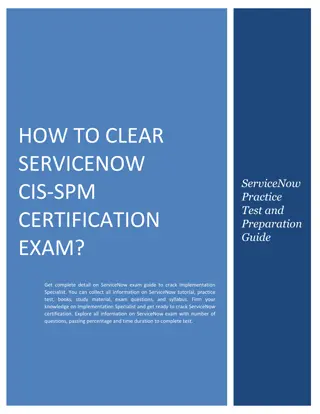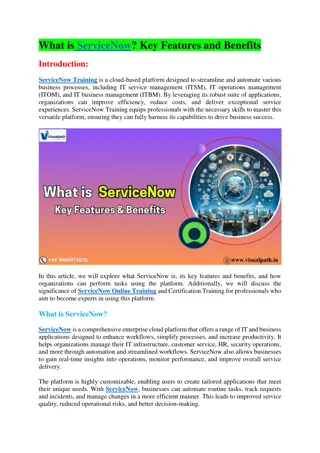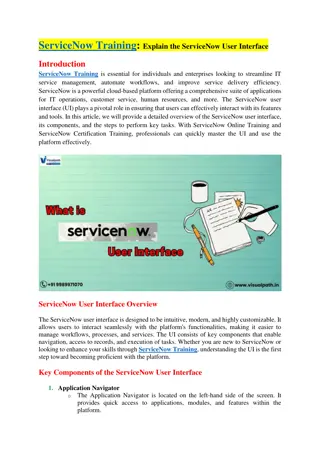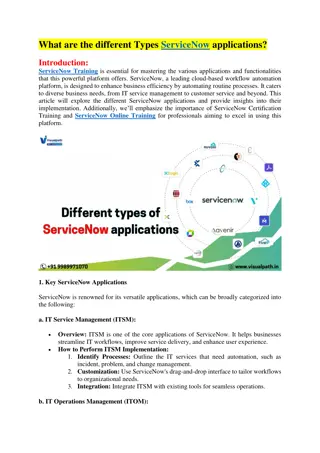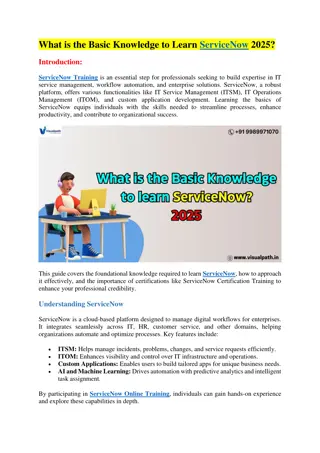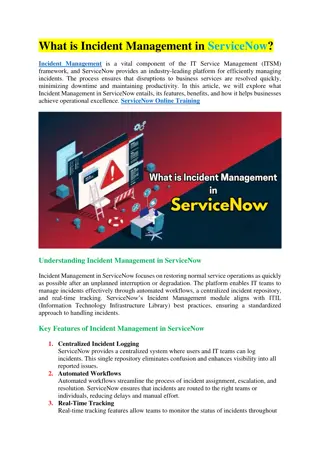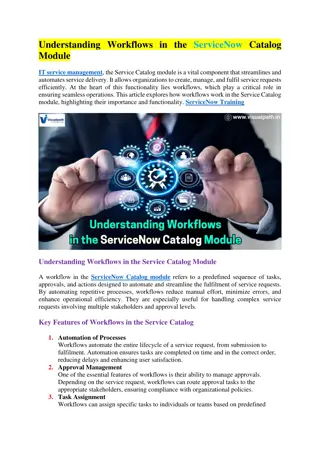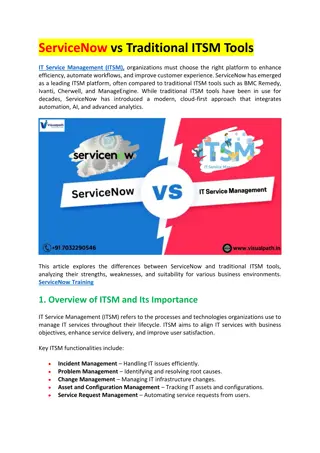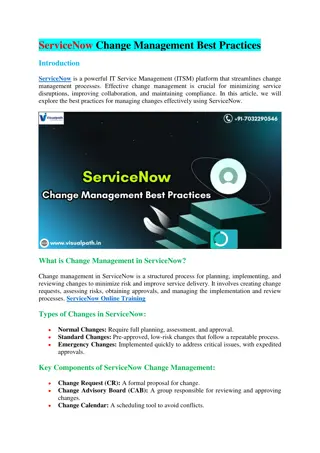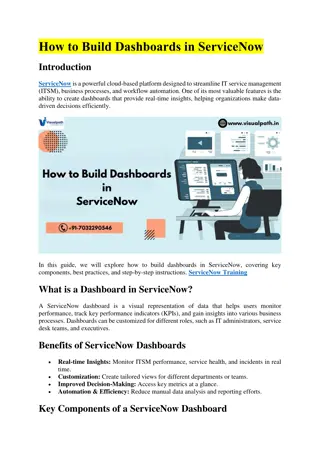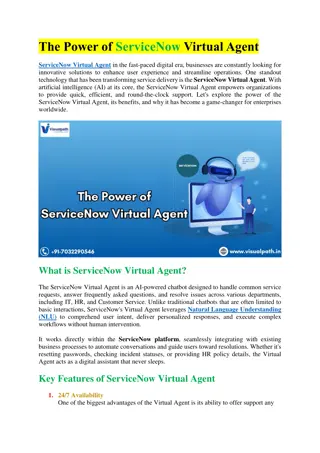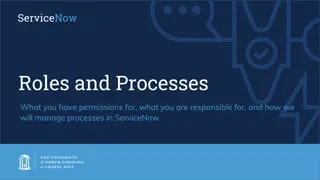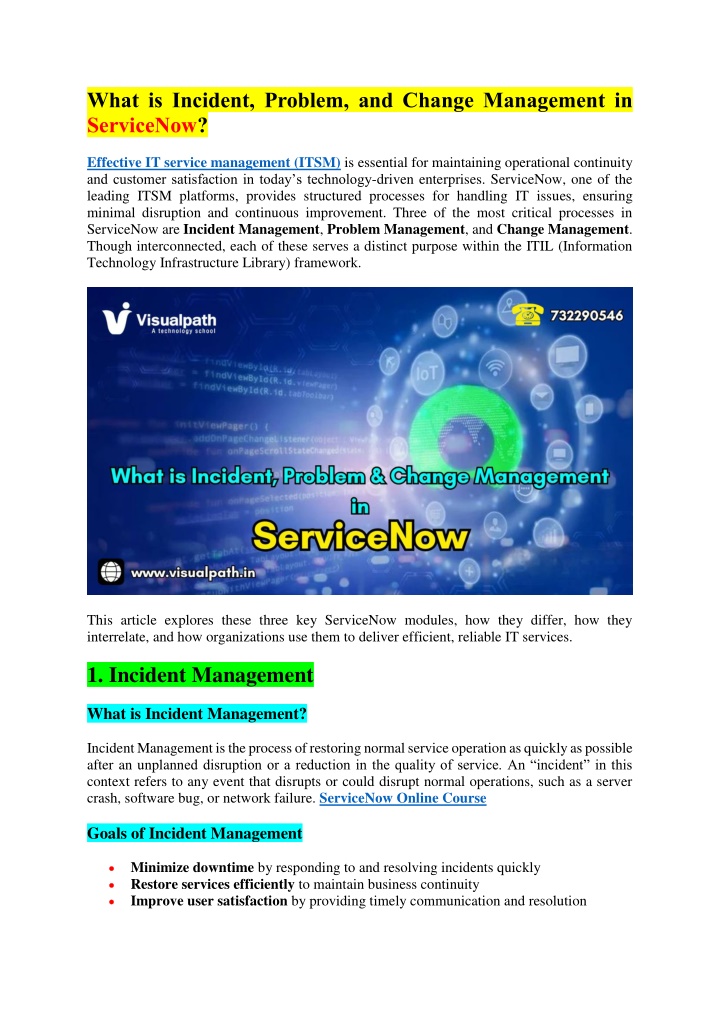
Best ServiceNow Course - ServiceNow Training in Hyderabad
VisualPath offers an expert-led ServiceNow Course with real-time projects and hands-on experience. Join our ServiceNow Training in Hyderabad for 24/7 access, daily class recordings, and personalized mentorship. Boost your career with resume-building
Uploaded on | 1 Views
Download Presentation

Please find below an Image/Link to download the presentation.
The content on the website is provided AS IS for your information and personal use only. It may not be sold, licensed, or shared on other websites without obtaining consent from the author. If you encounter any issues during the download, it is possible that the publisher has removed the file from their server.
You are allowed to download the files provided on this website for personal or commercial use, subject to the condition that they are used lawfully. All files are the property of their respective owners.
The content on the website is provided AS IS for your information and personal use only. It may not be sold, licensed, or shared on other websites without obtaining consent from the author.
E N D
Presentation Transcript
What is Incident, Problem, and Change Management in ServiceNow? Effective IT service management (ITSM) is essential for maintaining operational continuity and customer satisfaction in today s technology-driven enterprises. ServiceNow, one of the leading ITSM platforms, provides structured processes for handling IT issues, ensuring minimal disruption and continuous improvement. Three of the most critical processes in ServiceNow are Incident Management, Problem Management, and Change Management. Though interconnected, each of these serves a distinct purpose within the ITIL (Information Technology Infrastructure Library) framework. This article explores these three key ServiceNow modules, how they differ, how they interrelate, and how organizations use them to deliver efficient, reliable IT services. 1. Incident Management What is Incident Management? Incident Management is the process of restoring normal service operation as quickly as possible after an unplanned disruption or a reduction in the quality of service. An incident in this context refers to any event that disrupts or could disrupt normal operations, such as a server crash, software bug, or network failure. ServiceNow Online Course Goals of Incident Management Minimize downtime by responding to and resolving incidents quickly Restore services efficiently to maintain business continuity Improve user satisfaction by providing timely communication and resolution
Incident Lifecycle in ServiceNow 1.Detection and Logging: Incidents can be logged manually by users through self- service portals or automatically by monitoring tools integrated with ServiceNow. 2.Classification and Prioritization: Incidents are categorized by type and assigned a priority based on impact and urgency. 3.Assignment: Incidents are routed to the appropriate support group or technician. 4.Investigation and Diagnosis: The assigned team troubleshoots and identifies the cause of the issue. 5.Resolution and Recovery: The team resolves the incident, and the affected services are restored. 6.Closure: After confirmation from the user, the incident is closed and documented for future reference. Key Features in ServiceNow SLAs (Service Level Agreements) to track resolution times Knowledge Base Integration to speed up troubleshooting Automated Routing and Escalation to improve response times Self-Service Portals to reduce ticket volumes 2. Problem Management What is Problem Management? While Incident Management focuses on immediate restoration, Problem Management aims to identify and eliminate the root causeof recurring incidents. A problem is the underlying cause of one or more incidents. Problem Management is more proactive and analytical, seeking to reduce the number and impact of future incidents. Goals of Problem Management Prevent incidents from recurring by identifying their root causes Minimize the impact of unavoidable incidents Ensure permanent solutions are implemented Improve service quality and system reliability Problem Management Process in ServiceNow 1.Problem Detection: Problems can be identified from recurring incidents, major incident reviews, or proactive trend analysis. 2.Logging and Categorization: Problems are logged in the system and categorized for better tracking. 3.Prioritization and Assignment: Problems are assessed based on business impact and assigned to specialists. 4.Investigation and Diagnosis: Detailed analysis is performed to identify the root cause using tools like root cause analysis (RCA) and 5 Whys. 5.Workarounds and Known Errors: Temporary solutions (workarounds) are documented in the Known Error Database (KEDB). ServiceNow Training
6.Resolution and Closure: Permanent fixes are applied through Change Management processes, and the problem is closed after validation. Benefits of ServiceNow Known Error Database to link problems with incidents and solutions Root Cause Documentation for future reference Collaboration Tools to coordinate between technical teams Proactive Problem Management through analytics and dashboards 3. Change Management What is Change Management? Change Management controls the lifecycle of changes to IT systems to minimize risk and impact on service. A change refers to any modification to the infrastructure, applications, systems, or processes. This could include deploying updates, replacing servers, or changing access permissions. Unlike Incident and Problem Management, which are reactive, Change Management is strategic and planned, ensuring that every change is evaluated, approved, and implemented with minimal risk. Goals of Change Management Minimize risk associated with IT changes Ensure changes are approved, tested, and communicated properly Reduce service disruptions due to poorly managed changes Improve the organization s adaptability to business and technology needs Change Lifecycle in ServiceNow 1.Request for Change (RFC): Initiated by users or systems when a change is needed. 2.Review and Approval: Changes are reviewed by Change Managers or a Change Advisory Board (CAB) based on impact, urgency, and risk. 3.Planning and Testing: A detailed implementation plan is prepared, and changes are tested in staging environments. 4.Implementation: Approved changes are deployed in production under controlled conditions. 5.Review and Closure: The change is reviewed for success and closed if it meets acceptance criteria. ServiceNow Online Training Types of Changes in ServiceNow Standard Change: Pre-approved, low-risk, and repeatable (e.g., software patch) Normal Change: Requires full assessment and CAB approval Emergency Change: High-urgency changes needed to fix major issues (e.g., security breach)
Features in ServiceNow Change Schedules to visualize timelines and avoid conflicts Risk Calculators to assess potential impact automatically CAB Workbench for managing approvals and meetings Integration with CI/CD pipelines for DevOps environments How They Interrelate Although distinct, these three management processes are closely interconnected: Incidents can trigger Problems: If multiple users report the same issue, it might indicate an underlying problem. Problems can lead to Changes: Solving a problem often requires implementing a change, such as updating software or replacing faulty components. Changes can cause Incidents: Poorly managed changes can introduce new incidents, which is why Change Management is critical. ServiceNow Course Online ServiceNow seamlessly integrates these modules so that incidents, problems, and changes are linked through shared records, automation rules, and reporting dashboards. This holistic approach enhances traceability, accountability, and service resilience. Conclusion ServiceNow empowers organizations to manage incidents, problems, and changes systematically and collaboratively. Incident Management helps keep services running by responding quickly to disruptions. Problem Management identifies the root causes to eliminate recurring issues. Change Management ensures changes are planned, tested, and implemented with minimal risk. By using all three together, businesses can build a resilient IT ecosystem that supports agility, reliability, and continuous improvement. These processes are not just tools they are part of a mindset that transforms how organizations handle challenges, innovate solutions, and deliver exceptional service experiences. Trending Courses: Docker and Kubernetes, SAP Ariba, Site Reliability Engineering Visualpath is the Best Software Online Training Institute in Hyderabad. Avail is complete worldwide. You will get the best course at an affordable cost. For More Information about ServiceNow Online Training Contact Call/WhatsApp: +91-7032290546 Visit: https://www.visualpath.in/servicenow-online-training.html






